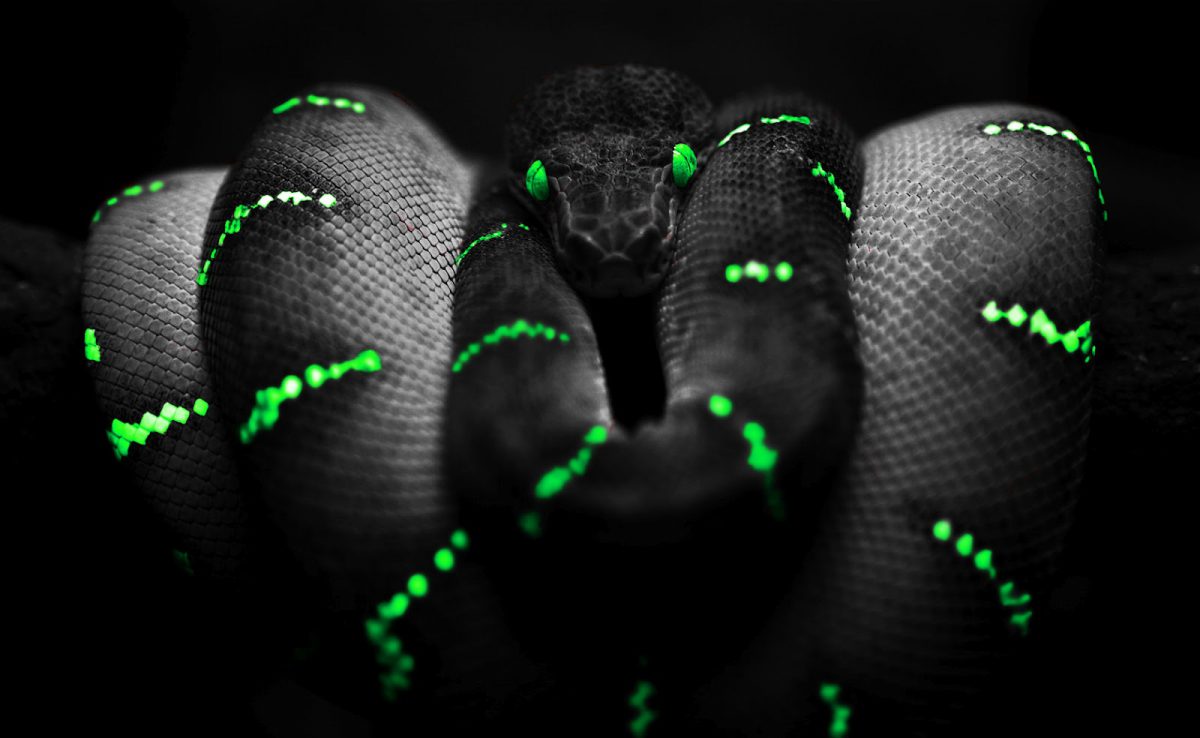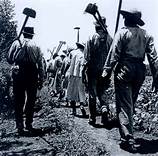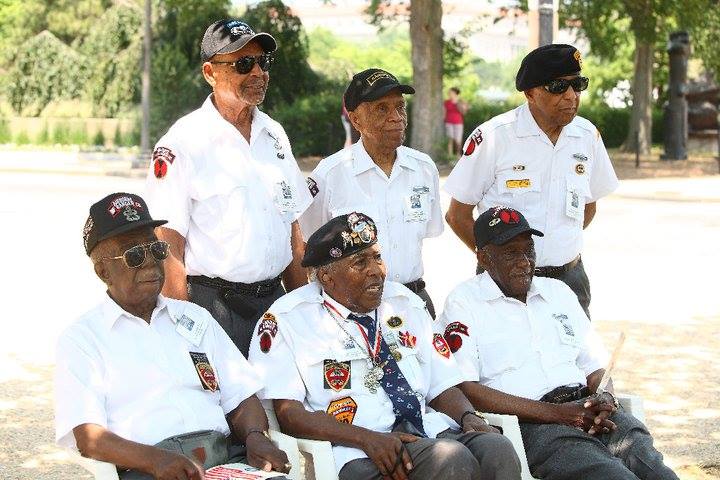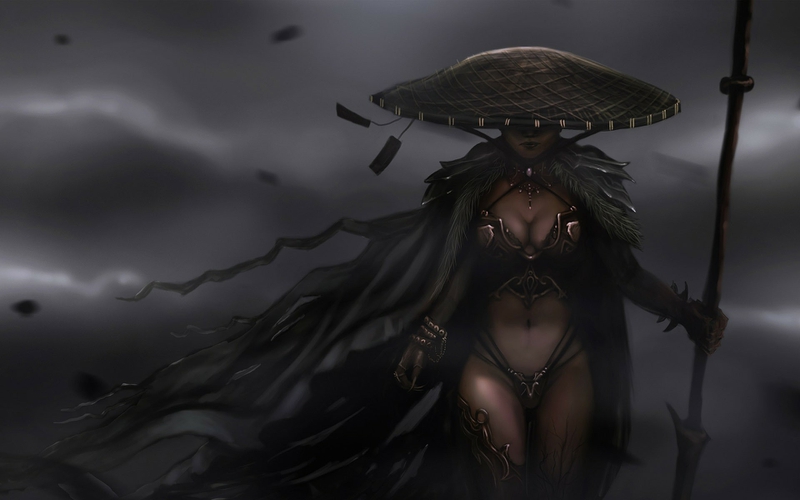5)
As it often happens when in a strange place for the first time, Leiko couldn’t sleep, and got up to skulk about the monastery to explore whatever piqued her curiosity, which was just about everything.
The dark halls with single torches intrigued her most, but she knew the monastery was likely labyrinthine, and didn’t want to risk getting lost.
She decided to see if Akira was up; perhaps he could make some sort of sleeping tea for her, if he wasn’t too angry at her behavior during dinner.
A bit peeved to find that she cared what he thought of her, she figured it was best to go apologize; he’d been kind to her, all things considered, and she hadn’t, as he’d promised, come to harm.
There was no threat here, at least not from the Brothers, but she could also sense an undercurrent of contained power, controlled, but almost throbbing like a heart, inside the walls, under the ground, a vibrancy running like a warm current tickling the fine hairs on her arms.
It was a sense of gathering power, and it gave her an excited, anticipatory fright.
If that was what they were going to teach her to harness and wield, she dreaded the learning of it, and never desired anything more.
Some of the doors were open, and she looked in to see the men packing large satchels. When they saw her, they hurriedly looked away, almost shamefaced.
She stood in the doorway of one, and the monk came over to close the door, but she wouldn’t leave.
“Leiko, I need privacy.”
“Are you leaving? Did Hakurou send you all on a journey? A mission?”
She saw his face change at the words ‘journey’ and ‘mission,’ and something clicked into place.
“You’re leaving.”
“Please…” he pushed the door at her again, not hard, but firmly, and she had no choice but to back away or let it hit her bare toes.
The lock clicked, and she heard him shuffle away.
They’re leaving because of me.
Disturbed, she went in earnest to find Akira, and ask what problems she’d be facing with them now that she was living here.
****************
“Come in, Ko.”
She went in, saw Akira standing by the small window, looking out at the yellow moonlight on the green grass, giving it a bluish cast.
“You knew it was me?”
He chuckled, but didn’t turn to her.
“No powers needed there; the brothers aren’t prone to knocking, and they’re a ham fisted lot if they do.”
“You called me ‘Ko.’ Hakurou changed my name. You call him master, but you defy him by using my old name.”
He turned to her then, looking at her intently; her observations were keen for one so young. Tigress by the tail…
“Between you and me, you will always be ‘Ko.’ That is the name I found you under, and the name in which you branded your father’s cheek with your spittle.”
She reddened at the memory, and looked away.
Good.
“It is also the first cord of our bonding, and I will only call you ‘Leiko’ when Hakurou is around.
“Are we agreed?”
She nodded, not wanting to speak yet, fearing her voice would squeak.
“You are not asleep; tomorrow, Hakurou’s going to start your training in the path of the Rei.”
She sat on the edge of his bed. “Some of the men are leaving because of me. I saw them.”
Akira inwardly cursed them for cowards.
“There is nothing to be done for it, Ko. Those that remain…”
“Those that remain…?”
He shook his head. “What is it you want?”
“Besides returning to Iwai? I’d like a sleeping tea, if you have any.”
“I do. I will even join you. Any later, and we will both see the sun before we topple.”
*****************
Hakurou’s voice was low thunder.
“I am grieved…so grieved I can no longer call you Brothers.
“You are craven, useless dogs.”
“You said to consider carefully, Hakurou. We all have—“
“No spines!” Hakurou’s fist slammed the large table they were sitting around, and they all jumped, blinking at the sudden fury of the motion and his expression.
Another monk spoke. “Maybe you shouldn’t issue edicts you don’t mean then, Hakurou.”
Hakurou sat down, the blood slowly leaving his face as his hand worried at his beard.
“You’re right. If you didn’t leave now, you’d prove a weakness in the fighting, and run, or die. Either way, you’d have the witches victorious, and this is not the time for people like you. I would say ‘men’, but that doesn’t fit you.”
The monk who first spoke stood. “I’ve had enough. You said we could leave. We’ve done our part, and served our gods; we want to go on serving them. We don’t want to die.”
Hakurou gave a bitter laugh.
“And if the witches win, pup, do you think they’ll leave you be?”
That gave them pause, and some of them remained sitting.
“He’s turned you? With that simplistic question, he changed your mind?”
One of sitting monks sighed. “He’s right, Brother Milal, there is no place to run they won’t find us.”
“But there’s a chance they won’t; there’s a chance we’ll survive, and as long as it’s there, I have to try. I have to take that chance.”
“Best be leaving then,” Hakurou said. “The sun is up soon, and Leiko’s first session will start at first light.”
They stood, and filed out in silence, giving the old wolf at least that much respect, dropping their pendants and rings in a reliquary beside the main doors.
***************
Leiko and Akira saw them leaving, and before Akira could react, she was off, running toward them.
“Wait! Please! Please wait!
The monk who spoke to Hakurou first stopped the rest of them, watching her wild eyed approach.
Seeing he was the leader, she went up to him.
“If you leave, sir, you weaken the monastery. You weaken us all.”
“I have no part in this war. It will be a bloodbath, and none of it theirs. You seem like an intelligent child, for a peasant’s daughter. Demand Akira return you to your homeland.
“Dosojin Monastery will be destroyed in the battle to come.”
“Are you a seer, now?” Akira interjected.
Milal looked at him as if he’d just bled on a hymnal.
“No, I’m a realist.”
“If you believe your god is real, ‘realist,’ then why don’t you stay and ask for victory? Your brothers need you.” Leiko said. “And I need you.”
He looked at her, incredulous: her rudeness knew no boundaries.
“He is not a god of warriors, you fool girl, he is a god of the temple. He watches over us in peace and in life, if we should so pray.”
She looked at him a long moment. He was bristling, but dared say nothing in front of Akira. He was shifting his feet under her gaze, and not making eye contact, but summoning backbone to stand straight and say:
“If there’s nothing else, child, we must go.”
She stepped aside, and as they filed past, the leader stood glaring at her, and she calmly bore it until it was his time to step forward on the path of stones.
As he passed her, she murmured so only the three of them heard her:
“Pray hard then, Milal.
As Akira began to close the door, she the fear in Milal’s eyes, but his pride wouldn’t let him capitulate.
He swallowed, and turned away from them, and walked out.
As the lock clicked, a roll of thunder resounded in the far distance.









